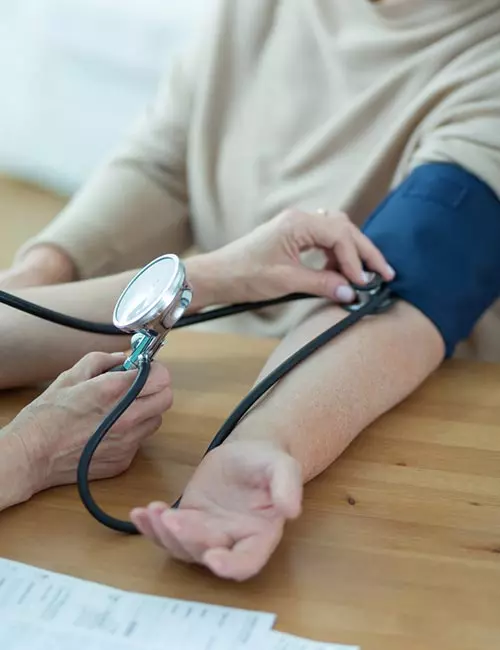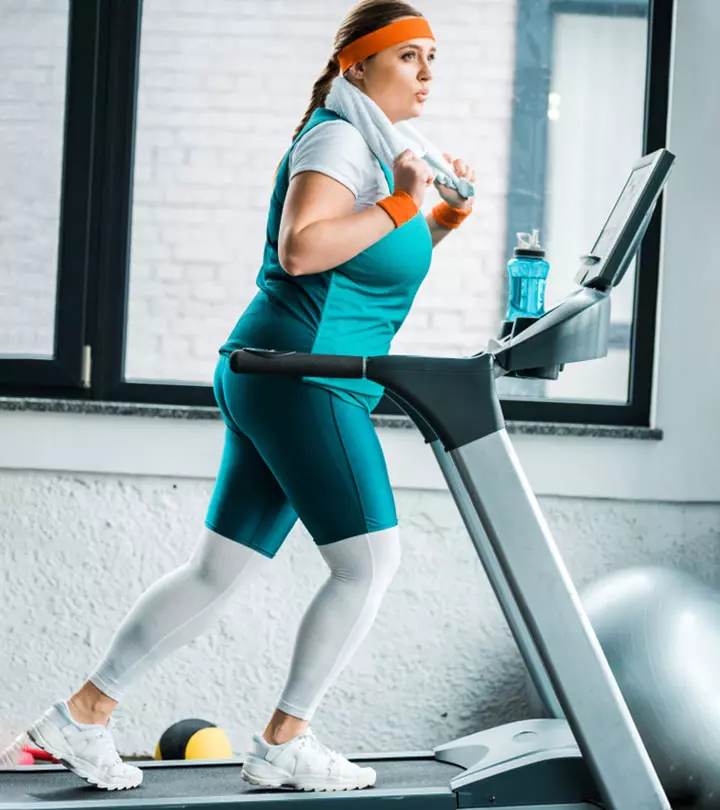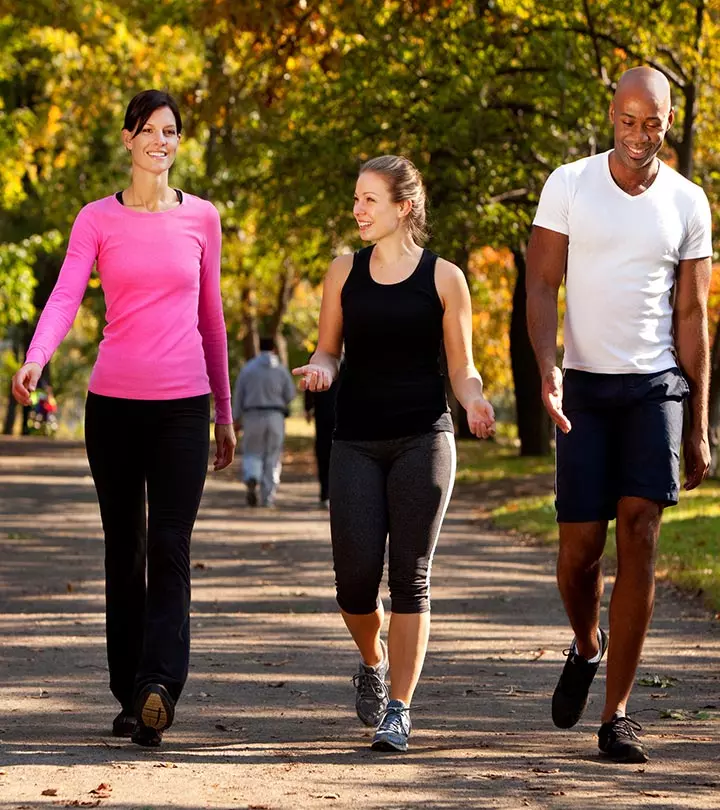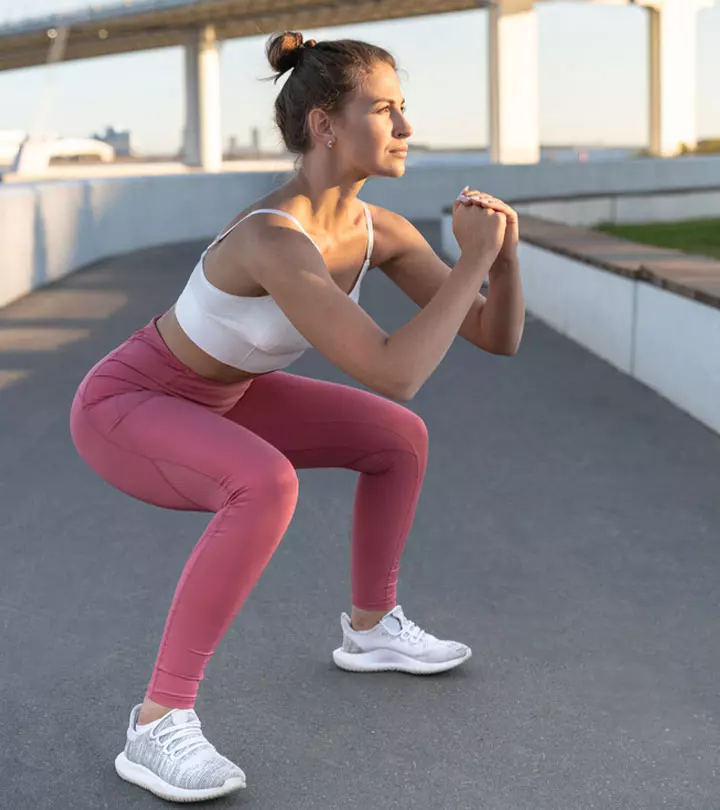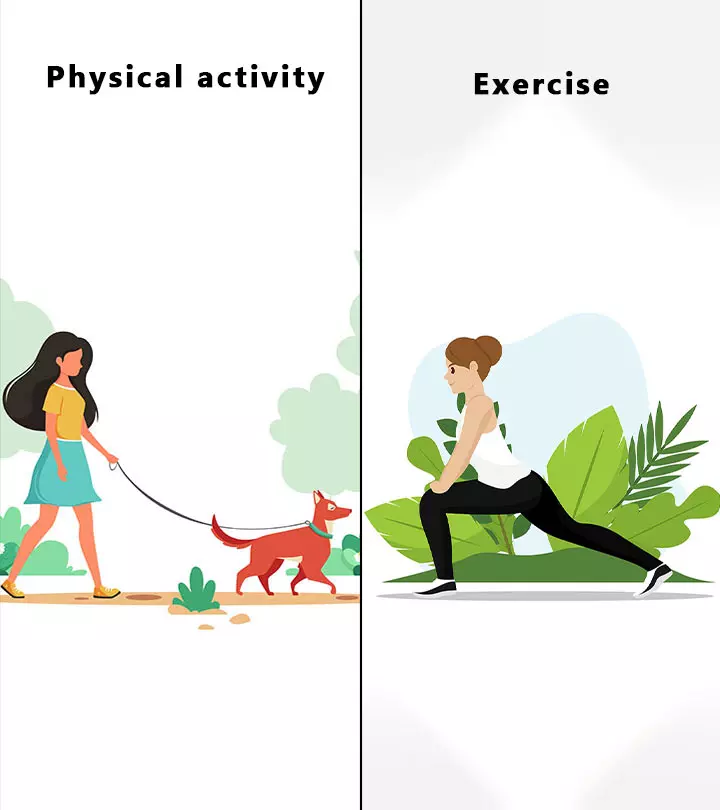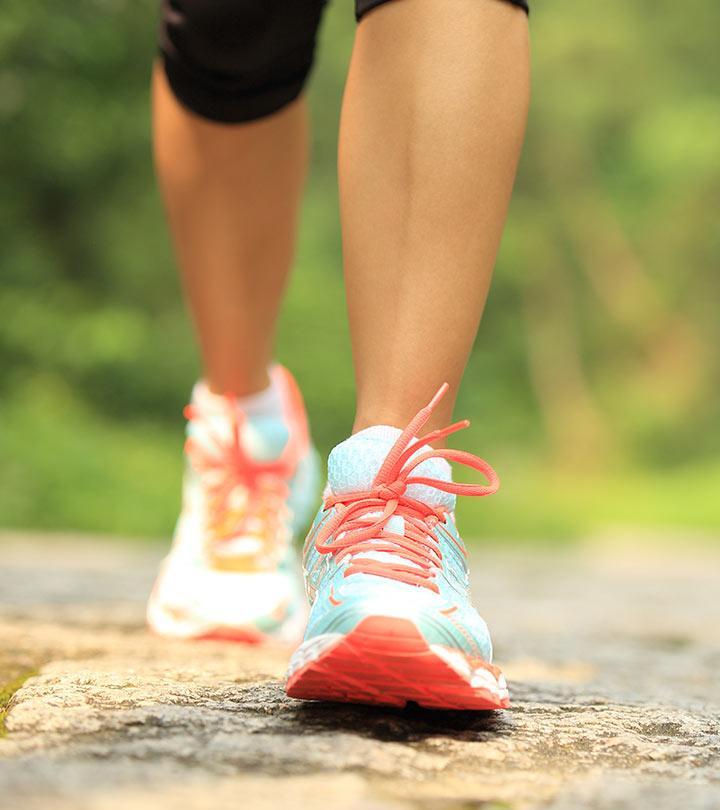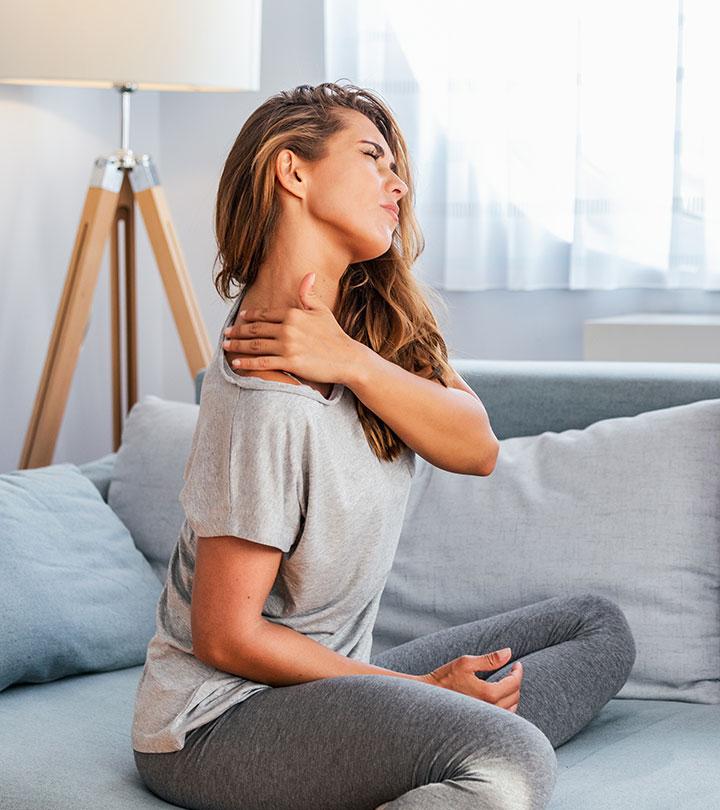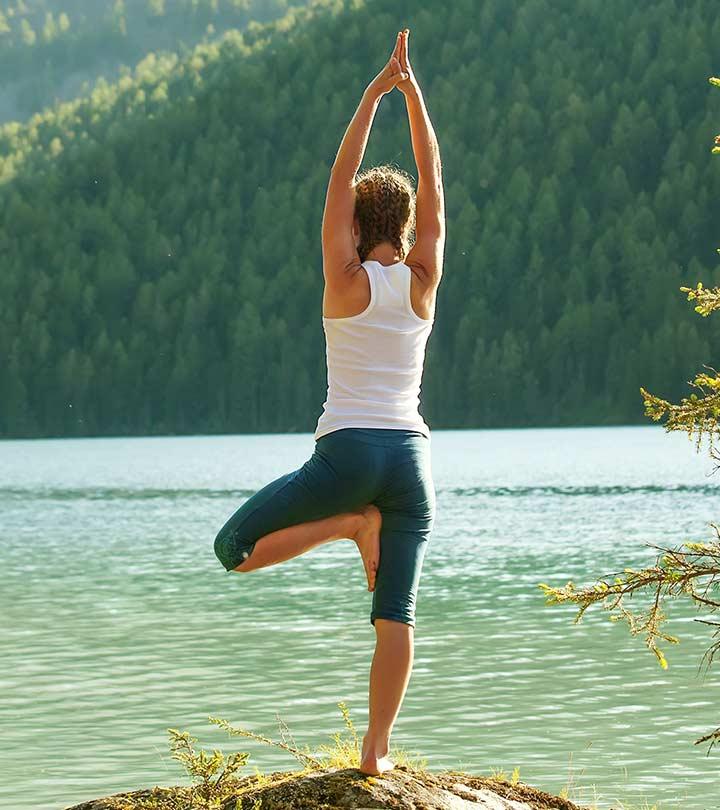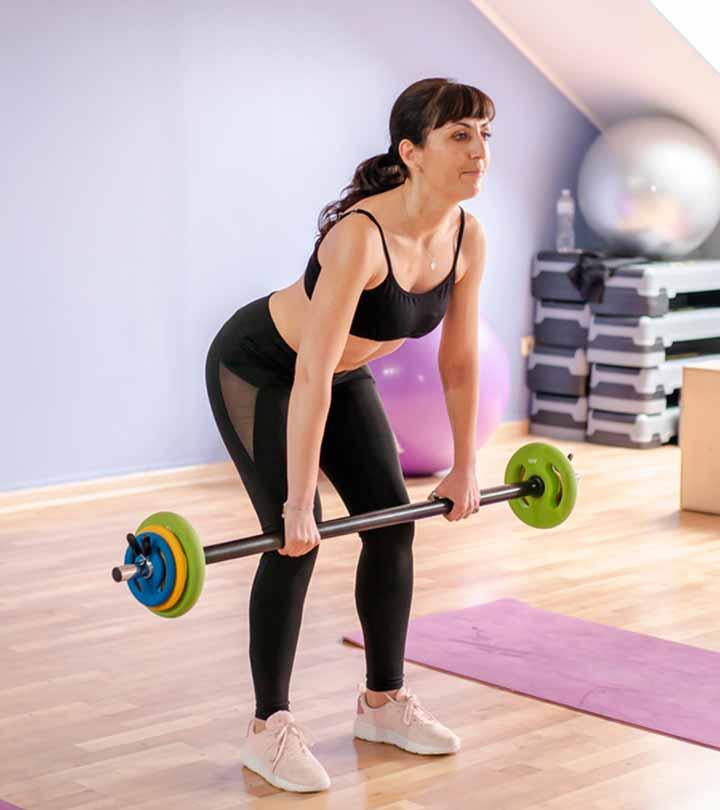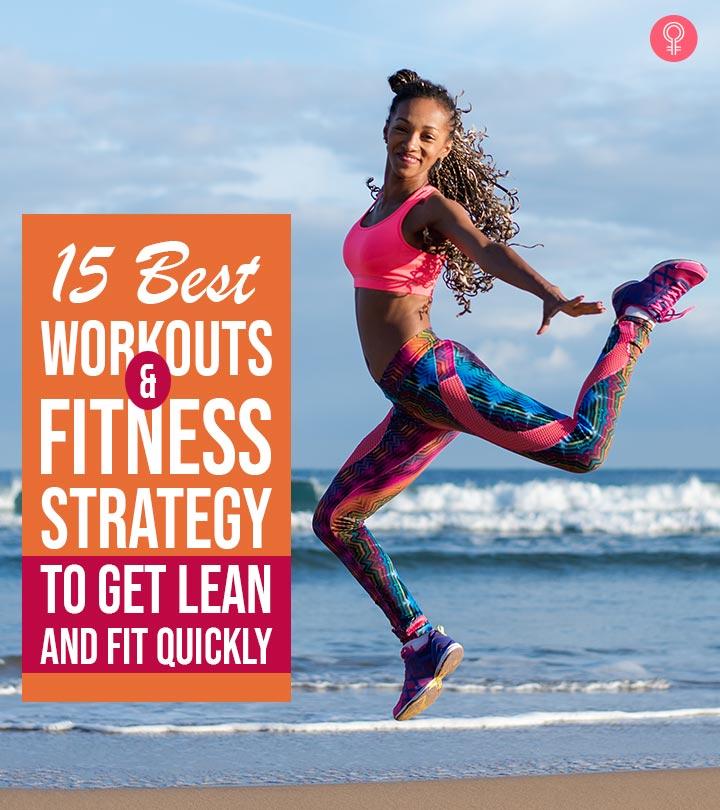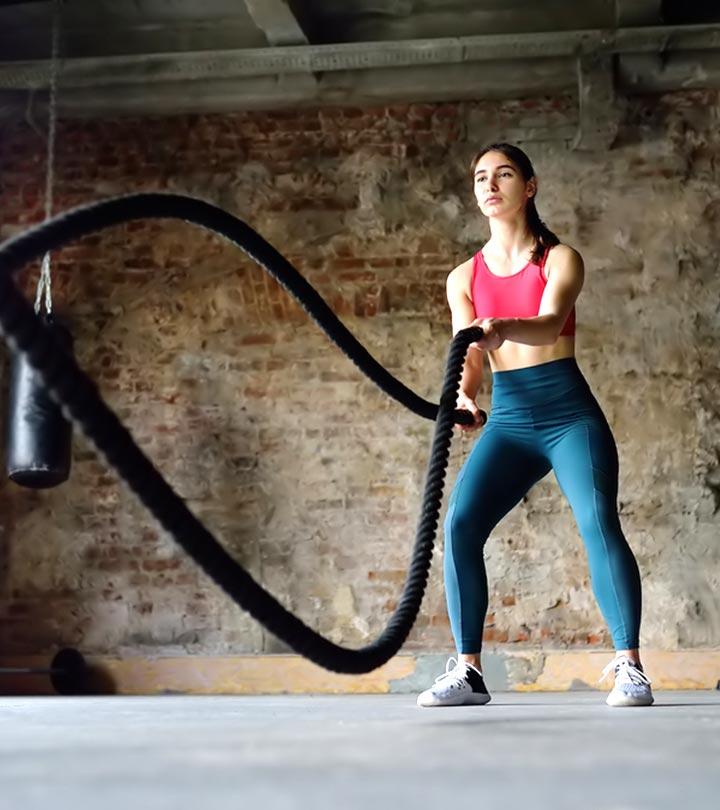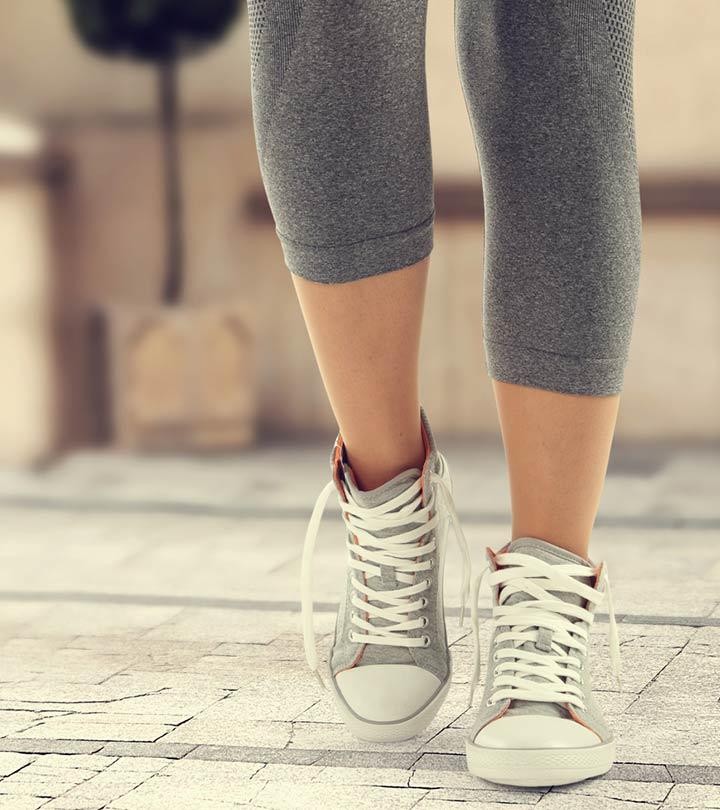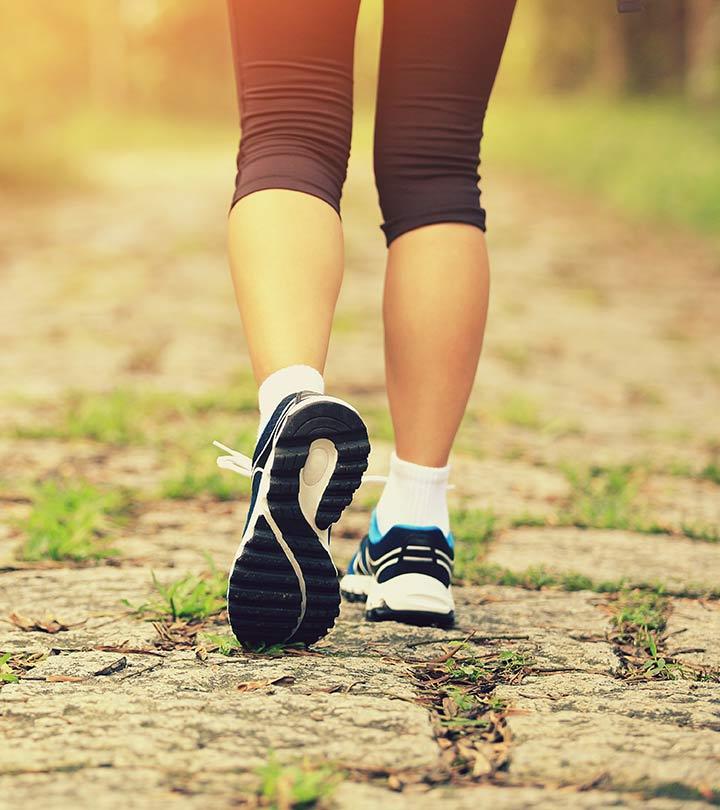20 Amazing Benefits Of Physical Exercises For A Healthy Life
Regular physical workouts can have benefits that compound over time.
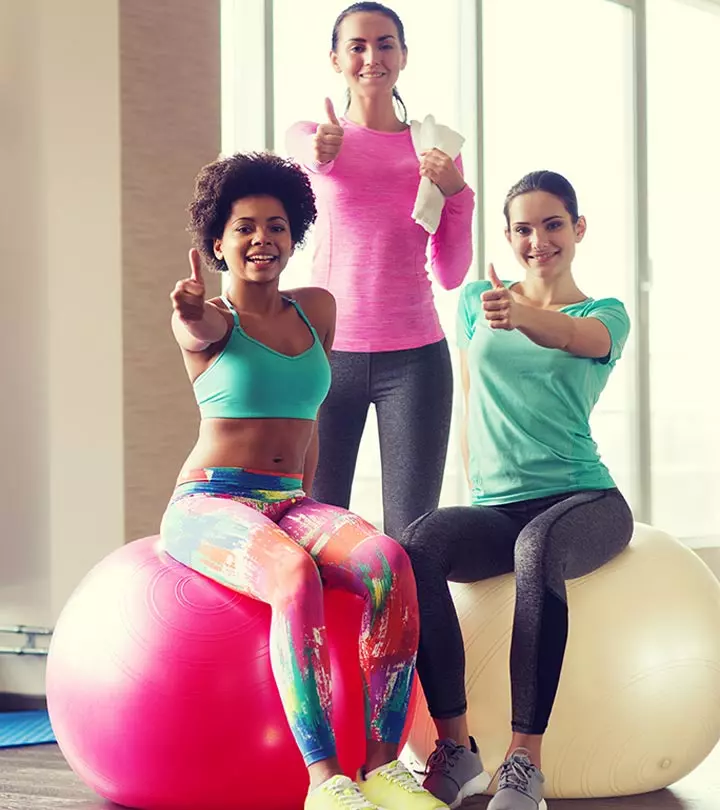
Image: Shutterstock
Staying active is ideal for keeping health issues at bay. There are many benefits of physical exercise. It can help reduce the risk of a plethora of diseases (1), (2), (3). For people aged between 6 and 65, the WHO recommends one to three hours of exercise per week to maintain physical fitness (4). Even 15 to 30 minutes of brisk walking, running, dancing, playing a sport, or strength training every day helps improve heart rate, muscle strength, immunity, and overall mental wellbeing (5). Check out the full list of the benefits of physical exercise here.
 Workout Blueprint: Physical Exercises For A Healthy Life
Workout Blueprint: Physical Exercises For A Healthy Life- Frequency: Daily
- Benefits: Reduce the risk of cardiovascular mortality and other health diseases, aid weight loss, strengthen muscles and bones, lower high blood pressure, and reduce stress
- Equipment Needed: Yoga mat, resistance bands, shoes, and workout clothes
- Space Required: Large area
- Assistance Required: Yes, for certain exercises
- Who Should Avoid: Anyone with an existing respiratory issue, joint problem, or heart condition.
In This Article
20 Benefits Of Exercise
1. Protects You From Cardiovascular Disease
It is not breaking news that cardiovascular disease is one of the leading causes of death. And that’s unfortunate. According to the American Heart Association, by 2030, cardiovascular disease is going to account for more than 23.6 million deaths (6). But scientists from around the globe agree that the mortality rate due to CVD can be reduced by regular exercising (7).
Improving your cardiovascular endurance can help assist you in carrying out your day-to-day tasks without the heaviness and fatigue that might plague you.
2. Aids Weight Loss
Physical exercise, coupled with proper nutrition, is the best way to lose weight (8). If you are borderline overweight, overweight, or obese, you must start exercising. It will help you shed the extra pounds by converting the excess calories into usable energy, which you need to breathe, talk, walk, exercise, and carry out various cellular functions. Weight management helps ward off many obesity-related diseases. By losing weight, you will be able to ward off many obesity-related diseases.
 Did You Know?
Did You Know?3. Reduces The Risk Of Type 2 Diabetes
Insulin resistance is when the body no longer responds to insulin. It causes an increased production of insulin by the pancreas. Since insulin promotes weight gain, an excessive amount of insulin production can lead to weight gain. Being overweight or obese increases your risk of insulin resistance. And that may lead to diabetes. Scientists have confirmed that regular physical exercise can reduce the risk of diabetes by 58% in high-risk population (10).
4. Strengthens Muscles And Bones
The health of your muscles and bones is very important. As you start aging, typically after 30 years, you start losing muscle mass and bone density. And that’s the reason many women above 30 suffer from loose skin, joint pain, and osteoporosis. Research reveals that strength training improves the mineral density of the bones, thereby protecting you from osteoporosis (11). In fact, strength training also helps improve muscle mass, muscle power, and muscle endurance (12).
5. Reduces Stress
The importance of exercise is not just limited to your physical health. It can even help if you are stressed. Stress not only hampers your sleep at night but also impairs your immune functions (13). Stress also leads to excess accumulation of harmful oxygen radicals in the body, which, in turn, leads to other diseases (14). Physical activity is highly beneficial in reducing stress. Whenever you feel stressed out, take a walk or run, and you will soon see a change in your mood.
Keerthana Cheluvaraj, a software engineer and yoga practitioner, shares her experience of taking up yoga again on her blog: “I thought I don’t have time for yoga and exercise and that I just have to work. But, as I restarted it, I realized it just increased my productivity and my mental health. I learned to handle work stress (i).”
6. Effective Treatment For Depression And Anxiety
Depression and anxiety are serious mental health issues, and you should not ignore them. Apart from taking medical advice, you must start exercising. Exercise helps release serotonin, the “feel good” hormone that helps uplift your mood and works as the best anxiety reduction and depression management pill. Norwegian scientists conducted an experiment with 977 patients and found that physical exercise improved the mood of depressed patients (15).
7. Lowers High Blood Pressure
High blood pressure can lead to heart attack, stroke, and even death. And it is mainly caused due to bad eating habits, a sedentary lifestylei Inactive lifestyle with little to no physical activity and prolonged hours of remaining in a stationary position. , and/or inherited genes. If you suffer from hypertension or high blood pressure, you must take care of your diet and start exercising. Scientists studied about 800 people with high blood pressure for six months and found that exercising for 30 to 60 minutes, 3 to 7 days a week helped lower systolic blood pressure (16).
8. Reduces Risk Of Cancer
Cancer is one of the leading causes of death. It is caused due to faulty genes synthesizing faulty proteins, leading to uncontrollable cell division. It becomes dangerous when the cells metastasizei It refers to a particular disease spreading from one part of the body to another via blood or lymph vessels. and affect other body parts. Regular exercising not only helps reduce the risk of cancer but also has a positive effect on people undergoing cancer treatment (17).
9. Improves Digestion
According to a study published in Oxidative Medicine and Cellular Longevity, regular physical activity modifies the gut microflorai Bacteria and organisms that live inside the intestine and help digest food. Vitamin K and biotin are made by gut microflora. . This helps improve immune function and digestion and positively influences mucosal homeostasisi A state of steady physical, chemical, and internal conditions maintained by living systems for proper functioning. (18). As a result, your digestion and bowel movement will improve, and this metabolism boost will lead to weight loss and better health.
10. Boosts Brain Function And Memory
Both brain function and memory are influenced by physical exercise and help maintain your brain health. American scientists confirm that aerobic exercise can help prevent age-related brain tissue loss, improve attention span, and enhance the ability to process information quickly (19). Exercise helps improve your cognitive function while keeping your brain active to help you perform better in your daily activities. Memory improvement is an added benefit and helps you retail details that might easily slip out of your mind.
11. Reduces Low Back Pain
Low back pain has affected about 540 million people worldwide . And the only way you can get rid of it is by exercising regularly. Do stretching exercises – they help strengthen the bones and muscles in the lower back. Studies proved that exercise helped about 10-50% of patients suffering from low back pain (20). However, avoid exercises that repeatedly need the lower back to switch from the anterior to the posterior pose.
12. Strengthens The Lungs
Whether you have healthy lungs or suffer from a lung condition, doing moderate exercise for 30 minutes, 5 days a week, can have a positive impact on your lungs. You may feel out of breath, but by exercising regularly, you will be able to train your lungs, heart, and muscles, thereby increasing your stamina over a period (21).
13. Improves Sleep Quality
Exercising sure has some good effects on sleep. It is the best day-time activity that induces good quality sleep. When you sleep, your muscles, bones, and brain get rejuvenated, which allows you to make better decisions the next day. Exercise is the best, safest, and cheapest treatment for insomnia.
14. Increases Flexibility
Exercising improves the flexibility of your bones and muscles. American scientists conducted an experiment on college athletes and found that those who practiced yoga were more flexible than those who didn’t. Exercising can also help older adults improve the range of motion of their muscles and bones (22). Just 30 minutes of exercise, 3-5 days a week, can help older adults improve flexibility and get various health benefits.
15. Increase Your Energy Levels
Feeling fatigued and low in energy all the time is the most common problem that we face today. The reasons may range from being overworked to leading a sedentary life. But the only medicine that you can have is regular exercise. Scientists agree that regular exercise has a positive effect on energy levels. In fact, based on my personal experience, physical activity helps improve productivity as well. So, if you are feeling low, you should probably go for a run.
16. Revs Up Your Sex Life
Just like healthy flirting is good for the heart, exercising is good for better sexual intimacy. And this is not only for perfectly healthy individuals but also for women suffering from depression and multiple sclerosis, couples dealing with prostate cancer, and men who have erectile dysfunctioni A physical or psychological condition that leads to the inability to keep or get an erection firm enough to have sexual intercourse. . Exercising helps improve mood and boosts stamina and heart function. Practice cardio and strength training on alternate days and do yoga every day.
17. Boosts Confidence Level
Whether you are 7 or 70, exercising or being physically active improves your confidence, self-esteem, and self-worth. It stimulates positive energy in your body and has amazing physical and mental health benefits. As mentioned before, exercise helps reduce depression, provides stress relief, helps lose weight, and protects from various health issues – the major reasons for an individual’s low self-worth and confidence.
18. Improves Balance And Posture
Balance and posture are everything when it comes to preventing injuries and muscle pull. Regular exercising can help improve your posture, thereby adding an inch or two to your height. It helps to improve your gait and overall physical appearance and keeps your shoulders relaxed, chest up, and core tight. Exercising also helps older adults by preventing falls (23).
19. Improve Skin Health
Your skin is the largest organ, and while it protects the internal organs from the external environment, it can also be prone to microbial infections and other skin diseases. Since aerobic exercise makes you sweat, a lot of the microbes on the surface of the skin get washed away. It also improves blood circulation, giving your skin the perfect glow and warmth.
20. Increases Your Lifespan
As you can see from the above list, the effects of exercise are highly positive and there is almost nothing that exercising cannot fight or protect you from.
A study was conducted on 726,257 England citizens to assess the frequency of people engaging in moderate- to high-intensity physical exercises and activity. It recorded a 30% dip in physical activities in 2020 as compared to data from 2016–2019. Researchers implied this as a worrisome trend as physical activity is important for the prevention of premature mortality and chronic disease, immunity system, and mental health.
So, it is only logical that your life expectancy will increase when you do not suffer from diseases that can kill you. German scientists reported that exercising reduced the mortality rate by 30-35% and increased life expectancy from 0.4 to 6.9 years (24). The mantra is to live disease-free as long as you live – and that’s what exercising can help you achieve.
These are the 20 health benefits of regular exercise. Now, take a look at the exercise guidelines below.
Physical Activity Guidelines
- Avoid being sedentary.
- Do at least two hours of moderate intensity and one hour of high-intensity workout per week.
- Do strength training to prevent muscle loss and strengthen your bones.
- Play outdoor sports, swim, dance, walk, or run.
- If you have a desk job, get up and walk around every hour. Or get a standing work desk.
- Treat exercise as an enjoyable activity and not a punishment.
 Trivia
TriviaIf you are a beginner or are getting back to physical activity after a break, here are a few things to remember.
Things To Remember
- Talk to your doctor before doing high intensity and resistance training.
- Get a personal trainer if you are a beginner to prevent injuries.
- Wear comfortable clothes and proper shoes.
- Consume a pre-workout meal at least 45-60 minutes before your workout.
- Consume carbs post-workout within the two-hour window.
- Have protein-rich meals.
- Do fewer reps but focus on precision.
- Increase the sets and reps gradually.
- Do not lift heavy weights right on the first day.
- Keep going.
There are certain conditions where you must take your doctor’s opinion before you start exercising. Find them listed below.
See Your Doctor
- If moderate physical activity is causing chest pain
- If you go out of breath too soon
- If you have heart or lung issues
- If you are over 45 years of age
- If you feel dizzy
- If you are pregnant
Infographic: Health Benefits Of Exercise
Many people follow a sedentary lifestyle because of hectic work schedules and not spending enough time outdoors, so they don’t take out enough time to exercise. But finding time for at least moderate exercise regularly offers an array of health benefits. Exercise promotes overall health, from disease prevention to improving skin health.
The infographic below lists the various health benefits of exercise you must know. Check them out! Illustration: StyleCraze Design Team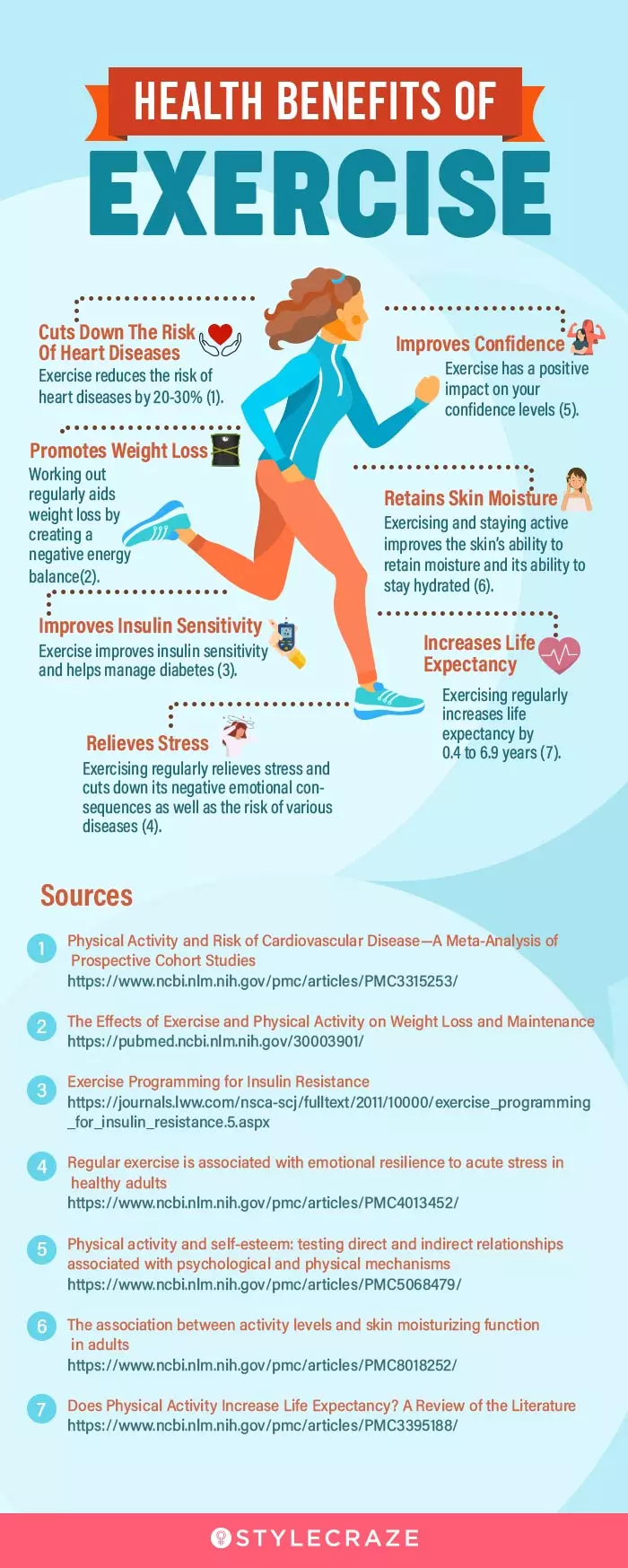
A sedentary lifestyle and hectic work schedules would leave your body used like a cycle chain without oiling. Your joints need movement as much as your muscles need that stretch for strengthening. Regular physical exercise not only helps keep your body fit but also boosts your mental well-being and overall immunity while improving your quality of life. If you are not someone cut for the gym and heavy machinery, try incorporating some fun physical activities like dancing, water aerobics, swimming, cycling, jogging, or any sports to keep your body moving. Practicing any of these physical exercises would help keep aches and pains away while strengthening your bones, muscles, cardiac, and digestive health to keep chronic diseases at bay.
Frequently Asked Questions
What are 3 social benefits of exercise?
Makes you feel and look confident, improves your image, and makes you fitter for any social responsibilities.
What are the benefits of exercise for students?
Improved focus, concentration, brain power, and creativity enhancement, along with agility, fitness, sports endurance, and longevity are some of the benefits of exercise for students.
What are 5 emotional benefits of exercise?
Helps you destress, relieve anxiety, bond with your workout buddies, gives a sense of accomplishment, and makes you feel good about yourself.
Key Takeaways
- Regular exercise may increase confidence as well as manage weight.
- Physical activity may help minimize sleep problems.
- Exercise may reduce the risk of various chronic diseases like diabetes.
- Exercise may increase energy levels and improve flexibility.
- Exercise may improve mental health and reduce stress.
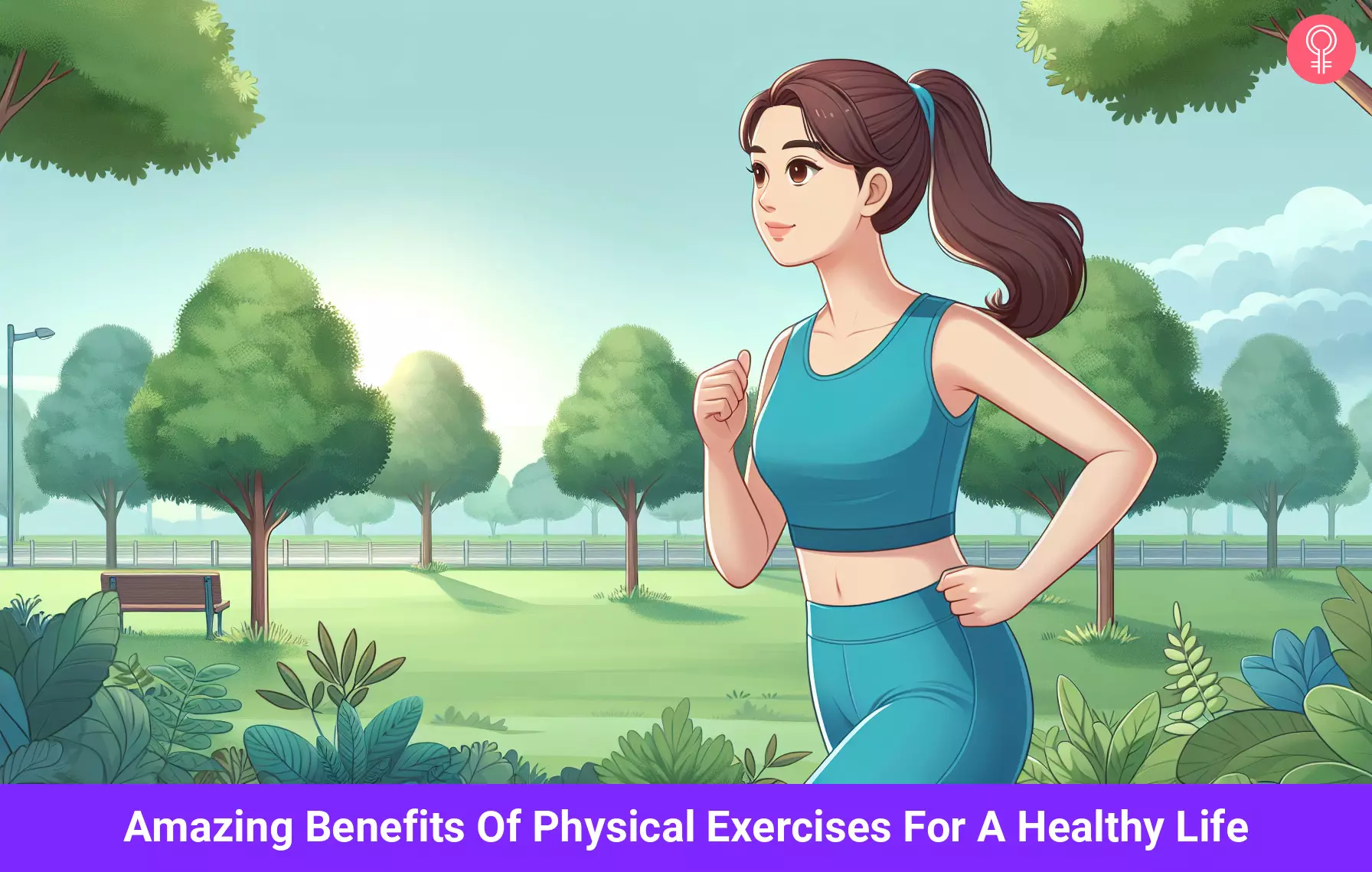
Image: Dall·E/StyleCraze Design Team
Struggling to exercise daily? From reducing stress levels to boosting your energy, watch this video to discover the numerous benefits of exercising to help you get started on your fitness journey.
Personal Experience: Source
StyleCraze's articles are interwoven with authentic personal narratives that provide depth and resonance to our content. Below are the sources of the personal accounts referenced in this article.
i. Physical exercise, the elixir of life!;https://medium.com/@keerthanac407/physical-exercise-the-elixir-of-life-5a242bf315c4
References
Articles on StyleCraze are backed by verified information from peer-reviewed and academic research papers, reputed organizations, research institutions, and medical associations to ensure accuracy and relevance. Read our editorial policy to learn more.
- “Exercise and diet reduce risk of diabetes, US study shows” British Medical Journal, US National Library of Medicine.
- “Effects of Nutrition and Exercise Health Behaviors on Predicted Risk of Cardiovascular Disease among Workers with Different Body Mass Index Levels” International Journal of Environmental Research and Public Health, US National Library of Medicine.
- “Prevention of Chronic Disease by Means of Diet and Lifestyle Changes” Chapter 44, Disease Control Priorities in Developing Countries. 2nd edition.
- “Physical activity” WHO.
- “Physical Exercise as an Effective Antiaging Intervention” BioMed Research International, US National Library of Medicine.
- “Heart Disease and Stroke Statistics—2018 Update: A Report From the American Heart Association” American Heart Association.
- “Prevention of cardiovascular diseases: Role of exercise, dietary interventions, obesity and smoking cessation” Experimental and Clinical Cardiology, US National Library of Medicine.
- “The role of exercise for weight loss and maintenance.” Best Practice & Research. Clinical Gastroenterology, US National Library of Medicine.
- “Physical Activity Patterns in the National Weight Control Registry” US National Library of Medicine.
- “Exercise and Type 2 Diabetes” Diabetes Care, US National Library of Medicine.
- “Physical activity in the prevention and amelioration of osteoporosis in women : interaction of mechanical, hormonal and dietary factors.” Sports Medicine, US National Library of Medicine.
- “Increasing Lean Mass and Strength: A Comparison of High Frequency Strength Training to Lower Frequency Strength Training” International Journal of Exercise Science, US National Library of Medicine.
- “The effects of chronic stress on health: new insights into the molecular mechanisms of brain–body communication” Future Science OA, US National Library of Medicine.
- “Stress, Oxidative Injury and Disease” Indian Journal of Clinical Biochemistry, US National Library of Medicine.
- “Effects of Exercise and Physical Activity on Anxiety” Frontiers in Psychiatry, US National Library of Medicine.
- “Is exercise good for high blood pressure?” British Medical Journal, US National Library of Medicine.
- “Exercise in cancer” Indian Journal of Medical and Paediatric Oncology, US National Library of Medicine.
- “Exercise Modifies the Gut Microbiota with Positive Health Effects ” Oxidative Medicine and Cellular Longevity, US National Library of Medicine.
- “Why exercise is good for your brain” EMBO reports, US National Library of Medicine.
- “Exercise as a treatment for chronic low back pain.” The Spine Journal, US National Library of Medicine.
- “Your lungs and exercise” Breathe, US National Library of Medicine.
- “Impact of 10-weeks of yoga practice on flexibility and balance of college athletes” International Journal Of yoga, US National Library of Medicine.
- “Exercise Leads to Faster Postural Reflexes, Improved Balance and Mobility, and Reduced Falls in Older Persons with Chronic Stroke” Journal of the American Geriatrics Society, US National Library of Medicine
- “Does Physical Activity Increase Life Expectancy? A Review of the Literature” Journal of Aging Research, US National Library of Medicine
- “Sports And Exercise” US Bureau of Labor Statistics.
Read full bio of Nathan Diaz
Read full bio of Ravi Teja Tadimalla
Read full bio of Himanshi Mahajan







